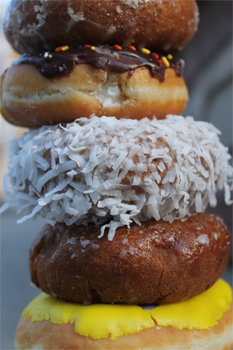The Big Brick Review 2015 Essay Contest: 1st Place ($300)
Building on the narrative of our lives...one brick at a time.

Turn of the Century
by Grace Fetterman
I WAS BORN and raised in the town where everybody claims to be Somebody, 90 hours a year are spent seething in traffic, and if you look closely at the children careening through the park like horses, you will realize that they are not just being children, but are actually enrolled in “Prancercising Class,” a costly fitness regimen involving springy and rhythmic ways of moving, similar to a horse’s gait and “ideally induced by elation.” It is the land of the sun and sunken cheeks: The Westside of Los Angeles.
When the new millennium approaches, I am in kindergarten, attending a small progressive school where math is secondary to individuality, and kindness is always more relevant than science. We call our teachers by their first names, for they, like us, are life-long learners, our equals both in the classroom and on the handball court.
On a sunny December morning, the sky ever serene and fair, our teacher, earnest, enthusiastic, and not much older than his students, Scott, summons us outside for an impromptu meeting.
“Do you know now, more than ever, how exciting it is to be alive?” Scott asks us. It’s a strange question, really. Not quite sure how to respond to that one, we answer in a silent incertitude. Being alive never seemed like something we needed to contemplate. We were always excited. We were five.
Scott continues, “We are all very lucky that we get to witness the first year of the 21st century, the 3rd millennium, the year 2000!”
Adam Nelson topples over on our shared bench and his head thuds on the pavement. A few kindergarteners laugh, while Stacey, Scott’s co-teacher, long-legged and vanilla-scented, tends to the rattled Adam Nelson. Stacey and Adam scuttle off to the nurse’s office, while Scott delivers the big reveal:
"There is going to be a party on the last day of school before winter break, but before any of you can start your vacations, you all must . . . EAT TWO THOUSAND DONUTS! THAT’S RIGHT, EACH OF YOU WILL EAT TWO THOUSAND DELECTABLE DONUTS BEFORE YOU CAN GO HOME FOR WINTER BREAK!"
Everyone erupts in massive applause, except for the ungainly girl with gauche bangs, sitting in the back, silently waiting to detonate. In her usual garb—plastic gloves, plaid pants, and a Babar the Elephant shirt—she realizes that she is going to die. It is her first memorable surge of panic, one that will oscillate for the next fifteen years. A vague anxiety that will hover within her, like a distant hum from an unknown source, forever there, never quite identifiable. From this moment on, she will always be a touch discomfited, never entirely present, and will bring a sense of hyper-vigilance, insecurity, and tension to every situation. This neurotic, self-obsessed girl is me. Or moi, as Barbar the Elephant would say.
My grandmother Rea, the temporary caretaker while my parents are in Guatemala, picks me up at 3:00 pm from our school’s chaotic carpool, armed with a mini Babybel cheese and peanut butter-filled pretzels. I resume my position in the back seat where I feign sleep in order to avoid conversation with this domineering and theatrical woman. All my life, people will comment on how my grandma is “larger than life” and “such a character.” I keep to myself how much she intimidates me. How she sucks the air out of the room. How she is always, subtly, impossible to please. My throat burns. I haven’t seen my parents since Thanksgiving. I have never felt so alone.
“My, you look awfully flushed,” she tells me. I shut my eyes and clasp my plastic gloved hands together. We can’t afford Prancercising class, so I have to rely on fantasizing for recreation and pseudo-cardio. I pretend I am pony, prancing through a field of flowers. But my dainty hooves are wearing plastic gloves, which make the prancing a bit slippery and dangerous. It’s OK, because pony-me has a risky side to her.
“I hope you aren’t getting sick. This would be a really, really bad week for you to be sick,” my grandma says, barreling through traffic, tapping her horn every few seconds, flipping the bird whenever deemed necessary.
When we get home, Rea rushes inside. We are expecting a call from my mother. The phone rings, and Rea picks up instantly.
Two years earlier, when I was three-and-a-half, my mom endured a uterine rupture in labor and gave birth to a stillborn. A nine-pound, full-term baby girl, who never took a breath of her own. (I am told years later, far into this new millennium, that if the delivery had continued for another ten seconds, my mother would have died too.) When my dad returned from the hospital that night, he had planned on telling me about the baby, Ella, but before he could, I reminded him that it was the first night of Hanukkah, so we should light the Shamash, open a gift, and play dreidel. The gift that night was a Play-Doh Doctor Drill ’n’ Fill Playset. My dad sat and played it with me all night, incapable of telling me what happened while I packed Mr. Drill ’n’ Fill’s head with Play-Doh and carved shapes into his clay teeth with plastic dentist tools. I woke up the next morning to find my grandmother and dad sitting at the dining room table, the most distraught I ever have and ever will see them. Thinking I knew how to comfort them, I told them that as soon as my mom and the baby returned from the hospital, “I promise that I won’t color Ella.” I explained to them that, the night before, I dreamt I painted all over my new sister, “but I promise I won’t.” After placing a plastic bowl of Cheerios for me on the table, his face the shade of Mr. Fill ‘n Drill’s Play-Doh teeth my dad told me that the baby didn’t make it.
Now, adding to the family by adopting a seven-month-old from Guatemala, my parents are far away and two thousand donuts haunt me. My grandmother hands me the phone.
“Hi, sweetie! I miss you so so so so much! We are meeting the lawyer, your future sister, and her foster mom today.”
The choking feeling in my throat enlarges. I feel unreal, detached, about to keel over any moment.
“Honey, are you there?”
“Scott is making us eat two thousand donuts or we can’t go home.”
“What?” my mom’s voice sounds like a cartoon. The room spins, my grandmother hovers.
“Two thousand donuts,” I whimper.
“Juice and donuts?” my mom sounds so distracted.
“Two thousand,” I try to explain.
“Well, that sounds so fun! You love donuts! Put Grammie back on the phone, will you, sweetie pie?”
The nights are insufferable. My grandmother sleeps an average of three hours, while I lie awake on the fold-out couch in her family room. With this newfound awareness of my looming death, everything feels even more unbearable. I close my eyes and see Scott shove donuts down my throat, while my classmates laugh and cheer him on. Suddenly, I burst; my limbs explode in Technicolor. I am never going to see my parents again. This little girl from Guatemala is going to have to fill the loss of not just Ella, but me too.
Light from the living room casts patches of gold on the walls and the carpets of the family room where I lie. My grandmother is making strange sounds, like she is trying to clear her throat but can’t. I climb out of the lumpy sofa bed, and go into the living room.
She is sitting hunched over stacks of papers, writing furiously, both exhausted and frenzied. She does not seem to see me.
“Grandma, what are you doing?”
Her explanation is garbled and incoherent. She tells me that all the computers in the world are going to cease operating in the year 2000. “All the information will be lost. There will be no information. Everything will be gone. I am writing down all my records before they are lost forever.”
And because I know sleep is unattainable, I am going to die before I can say goodbye to my parents, I will never meet my sister, hear her first words, watch her take her first steps, judge her boyfriends, the computers will crash and everything will be destroyed, I do nothing but write by my grandma’s side for the next five nights. I make believe that I am a prolific writer. I need to write everything I possibly can in the little time that I have left. I write a letter to my parents, elucidating my “dough-death,” telling them I love them more than anything in the world, and that they will “always be my best friends.” I write a message to my future sister, letting her know that she “can have my room if she wants,” and advise her to stay away from “lollipops she finds on the sidewalk.” I write a somewhat shameful and taboo love poem to Mr. Shea, my friend Ruth’s dad, and finally, a note to Scott, forgiving him for my demise.
The day has arrived. Scott approaches each of us, sitting patiently at our tables, delivering one pink pastry box per child. When everyone has their box of death sitting before them, he claps his hands, and grins.
“Go ahead,” practically dancing at this point, he instructs us, “Open your boxes!” Even though my math skills are profoundly inadequate, I know this doesn’t add up. There can’t be two thousand donuts in my little pink box. I feel a hand gently touch me on the shoulder near Babar’s big ears. It’s Scott. “Open your box.”
And I do.
My heart sings when I see that there are only four small donuts, shaped like numbers: two, zero, zero, zero. The entire class boos and jeers, except for the girl with gauche bangs. Her face beams. She is going to live.
That Sunday afternoon, my grandmother and I sit on the living room couch, looking out the window, our writing strewn about like the first draft of an incoherent novel. A taxicab pulls up. We can see the top of my dad’s head, big and bald, and my mom’s, her wispy, blonde hair evoking such a forceful a sense of relief that, for a moment, I cannot breathe. And there is my sister, the smallest head, her dark brown hair done in little pigtails. My grandmother starts to sob. “We are five. There are five of us now.”
The world spins forward. My mom boxes up our writing, and stores it in the back of her closet. It’s still there today. The millennium arrives. “We are five.” “We are five.”
![]()
Grace Fetterman is a senior at Reed College in Portland, Oregon, where she majors in English Literature. In her writing, Grace often explores the uncanny displacing the familiar. She has a corgi named Leopold Bloom, was a late walker but an early tap-dancer, and has been bartending for one month. She is currently researching gallows humor and grudges in the dramatic work of Martin McDonagh for her undergraduate thesis. This is her first literary award.
"Five Doughnuts" photo © 2015 Gregory Gerard
Tweet < back to the Reviewl